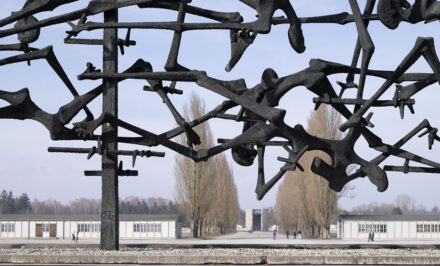![]() Sarah-Leah Pimentel. Schoenstatt enters its first Lent of the new century. Lent is a time of new beginnings, of spiritual rebirth. Perhaps we can say the same for Schoenstatt. In 100 years, Schoenstatt has matured, relationships in the Covenant of Love have deepened, and it has travelled to many new shores – both physical and spiritual.
Sarah-Leah Pimentel. Schoenstatt enters its first Lent of the new century. Lent is a time of new beginnings, of spiritual rebirth. Perhaps we can say the same for Schoenstatt. In 100 years, Schoenstatt has matured, relationships in the Covenant of Love have deepened, and it has travelled to many new shores – both physical and spiritual.
![]()
 However, as the Schoenstatt Family of the new millennium we shouldn’t be content only with our past achievements. In Schoenstatt’s second century, our Blessed Mother is asking us to go even further, calling us to even greater unity among ourselves and to bear abundant fruit for the Church and the world.
However, as the Schoenstatt Family of the new millennium we shouldn’t be content only with our past achievements. In Schoenstatt’s second century, our Blessed Mother is asking us to go even further, calling us to even greater unity among ourselves and to bear abundant fruit for the Church and the world.
So in many ways, we are like the new seed produced from the fruit of the parent plant. There would be no seed without the fruit. So too, Schoenstatt is a living force in our society today because of the sacrifices of many who yielded abundant fruit in the past.
Over the next six weeks, I’d like to use Fr. Kentenich’s analogy of the spiritual life as a seed, reflecting both on our own spiritual lives, as well as the life of our Family: “The fruitfulness of a seed depends, as we know from experience, on its natural ability to germinate, the quality of the soil and from outward factors – the sun, rain and wind. …What applies to the seed in nature can be applied to the seeds of our spirituality and a universal apostolate. The good earth they need is the natural and supernatural readiness to be generous, but above all, to be chaste and to love. Normally only those who are generous are capable [of living our spirituality]…Chastity is necessary according to the words of our Lord, Jesus Christ, “Blessed are the pure of heart, for they shall see God.” The outward conditions for growth [which our spirituality needs] are all sorts and degrees of difficulties, continual inner and outward battles.” (Joseph Kentenich, 1954/55, Kentenich Reader Vol. II, p. 25))
The seed’s natural ability to germinate
The seed has everything inside of it that it needs for the development of roots, a stem, leaves and flowers. Similarly, the soul possesses everything it needs to reach out to and touch God. The body – much like the seedcoat — is the outer casing for the soul, a soul that has known God intimately: “Before I formed you in the womb I knew you, before you were born I set you apart” (Jer 1:5). Our desire for happiness and fulfilment, our search for the meaning and purpose of our lives are simply our desire to be reunited with God. It’s all there already. We just need to retrieve it.
The trouble is that we often forget that we are more than just the seed. We have the potential to become beautiful lilies, sweet jasmine, hardy fynbos or great big oaks. Too often, however, we buy into the untruths that society feeds us about what we should look like and the definition of a successful life. And so we strive to all become identical, instead of developing our gifts and walking path that God has destined for us.
God calls us to be unique. He has given us all different skills and talents. Inside each of our hearts he has placed a different calling which reveals itself to us through our personalities, our temperaments, our emotions, the way we express ourselves and the way in which we relate to God and others, the events of our world that catch our attention.
Reflection
![]() Perhaps during this first week of Lent, we are being called to look inside ourselves, discovering the unique seed that is me. This will be helpful to determining the kind of soil and conditions that will be best suited to my growth.
Perhaps during this first week of Lent, we are being called to look inside ourselves, discovering the unique seed that is me. This will be helpful to determining the kind of soil and conditions that will be best suited to my growth.
What are my skills and talents? Is it my touch that brings comfort to those who are sad or hurting? Do I love to bring people together around a meal? Am I perhaps better at putting into words what others feel but cannot express? Do I create things with my hands that reveal a glimpse of God’s beauty?
What is my preferred way of praying? Do I derive peace from silently contemplating Christ in the Blessed Sacrament? Do my deepest prayer experiences and insights come through the Holy Spirit as I write in my journal? Am I constantly drawn to the scriptures and do they take on a deeper meaning as I read them repeatedly and slowly, allowing the words to penetrate my entire being? Or is my prayer most effective when I am take my rosary beads in my hand and with each bead, pray for someone who has asked for my prayers or is unable to pray for themselves? Or is perhaps my prayer the gentle strumming of a guitar as I slowly let all thoughts drop away and I find myself in God’s presence?
How do I relate to others? Am I the life and soul of the party, or am I the quiet one who enjoys observing the conversations around me? Do draw energy from others or do I need my quiet time in order to give my best to those around me? How do I respond to injustice? Do I speak out in righteous anger or am I better at working behind the scenes to respond to the needs of the victims of injustice? How do I respond to poverty and those who live on the edges of society? How do I see myself as a member of my family and my community? What role do I play in the Schoenstatt Family?
Prayer:
Heavenly Father, help us to recognize the seed you have planted in our hearts, so that we may grow to love, praise and honour you. We thank you that each seed is unique and that “to each kind of seed, [you] give it its own body” (1Cor 15:38) and we want to discover the plan and purpose you have for us. We pray that as our seed grows, we may become your instruments. Amen.
Sarah-Leah Pimentel, from Cape Town, South Africa, is media analyst and translator, and member of the board of editors of schoenstatt.org.














Excellent Lenten challenge and thought provoking meditation!
Thank you Sarah-Leah!
Thank you Sarah-Leah for this meditation on our Father’s words and for giving us reflection for our Lenten journey. Mphc-ev